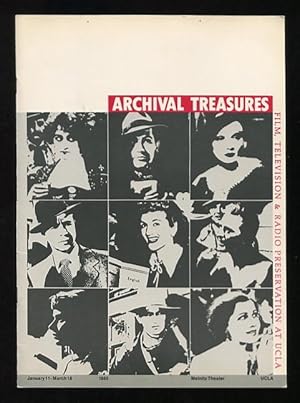Ucla Film Television Radio Archives (1 results)
Product Type
- All Product Types
- Books (1)
- Magazines & Periodicals
- Comics
- Sheet Music
- Art, Prints & Posters
- Photographs
- Maps
-
Manuscripts &
Paper Collectibles
Condition
- All Conditions
- New
- Used
Binding
- All Bindings
- Hardcover
- Softcover
Collectible Attributes
- First Edition
- Signed
- Dust Jacket
- Seller-Supplied Images
- Not Printed On Demand
Seller Location
Seller Rating
-
Archival Treasures: Film, Television & Radio Preservation at UCLA
Published by UCLA Film, Television & Radio Archives, Los Angeles, 1985
Seller: ReadInk, ABAA/IOBA, Los Angeles, CA, U.S.A.
First Edition
Stapled wraps. Condition: Near Fine. First Edition. [faint handling wear only]. (B&W photographs) Program book for a film series that ran at UCLA from January 11-March 16, 1985, showcasing numerous films, television programs, and radio broadcasts that had been preserved by UCLA at its archive, "one of the nation's preeminent centers for the preservation and study of motion pictures and the broadcast media." This was the first program of its kind presented by UCLA, and was the seed for what would become its long-running, almost-annual "Festival of Preservation" event, which was inaugurated under that title in 1988 and recently (2022) presented its 20th incarnation. Among the dozens of films featured were: Josef von Sternberg's THE SCARLET EMPRESS; Ernst Lubitsch's THE LOVE PARADE and MONTE CARLO; F.W. Murnau's TABU; John Ford's STAGECOACH; Frank Borzage's HISTORY IS MADE AT NIGHT and MOONRISE; Max Ophuls's CAUGHT; Robert Rossen's BODY AND SOUL; and numerous others. Television-related presentations included a program devoted to the DuMont Network, and on the radio side, a tribute to Fred Allen's "Allen's Alley" (although this was primarily done throught the presentation of two related feature films). The 28-page program book includes introductory comments by Robert Gitt, the Archive's Director of Preservation, and Edward Richmond, then its Acting Director.


